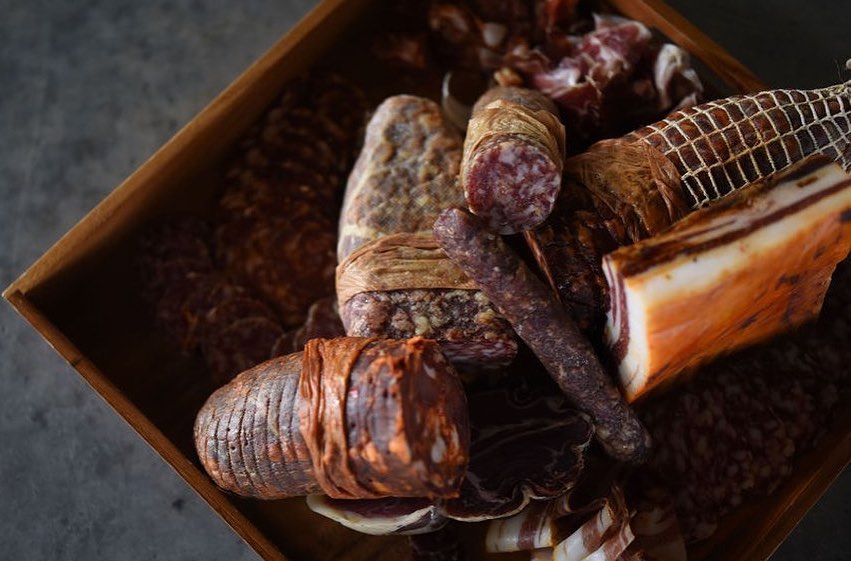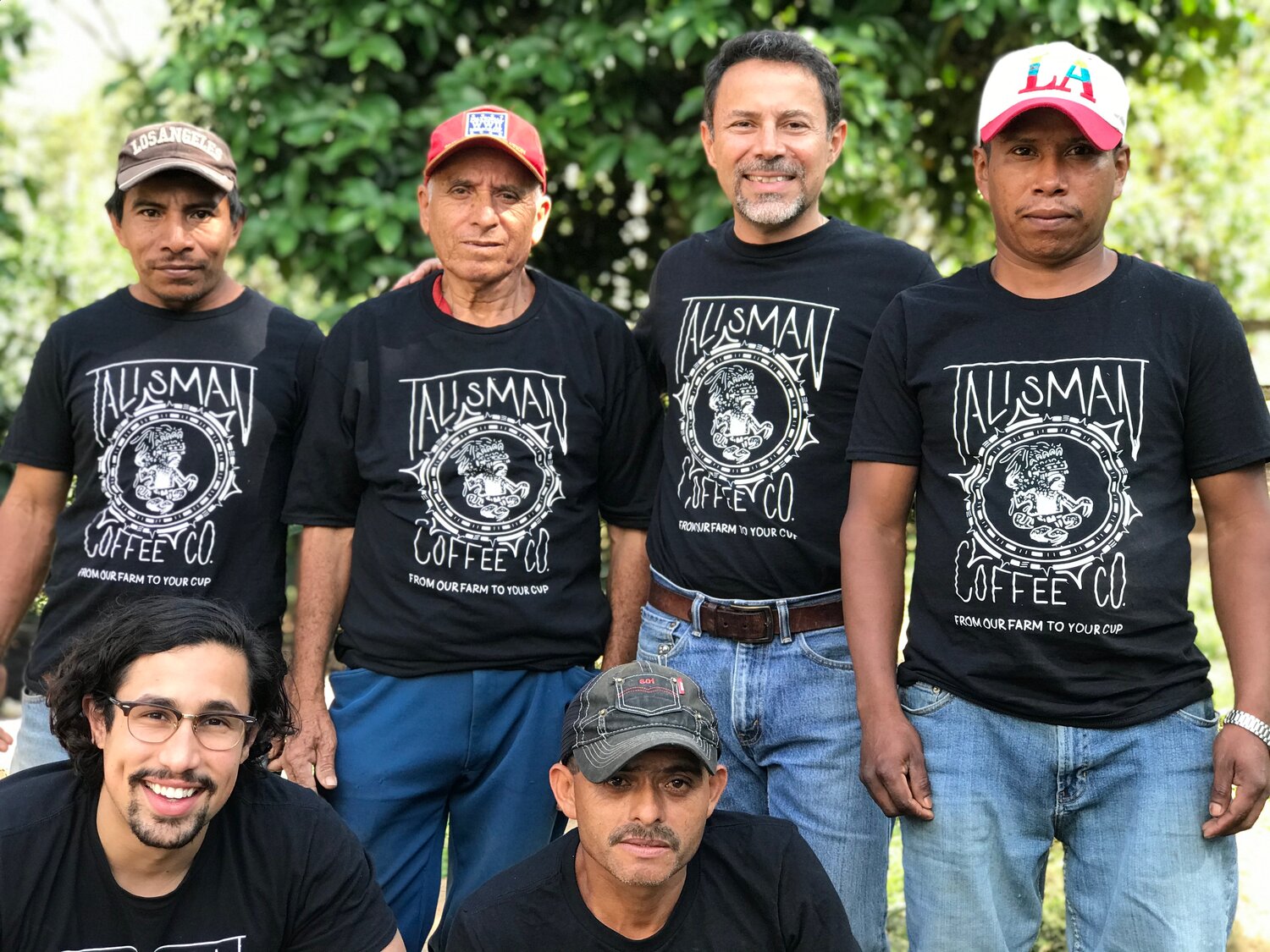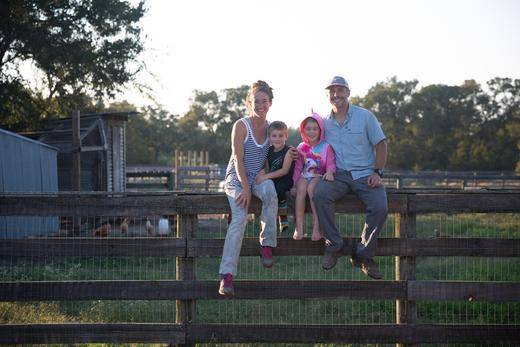Our Producers
The origin story of The Salumeria is rooted in equal parts DNA and destiny. The founders, Anthony Pedonesi and Gerardo Garcia, both grew up in homes where meat was a cornerstone of not only family meals, but also family culture.
Anthony’s obsession started young, when he would spend hours making salami in the backyard with his dad — a longstanding tradition that resulted in family recipes and techniques being perfected and passed down from one generation to the next.
Gerardo didn’t grow up curing meat like Anthony, but he was raised in McAllen, Texas, where he would watch in awe as his uncle butchered whole goats for family gatherings.
A mutual meat fascination was indeed in their blood, but it wasn’t until Anthony hired Gerardo to help remodel his home that the two struck up a friendship that would ultimately lead them to open The Salumeria. Bonding first and foremost over the experience of being new fathers, today, they revel in the joy of showing their children the ropes of the business in hopes that they will one day carry the tradition forward.
As for the food, though we can only speculate about precisely what makes their savory selection of cured meats so delicious, it unquestionably begins on the 200-acre Salumeria Farm, where they treat their prized heritage pigs to the good life. From eating hormone- and antibiotic-free diets, to lounging in state-of-the art deep straw bedded houses, to foraging on the “salad bar” or cooling off in the wallow — these pigs are among the happiest and healthiest you’ll find anywhere.
The Talisman story begins in 19th century Nicaragua, where the Alvarado family farmed coffee near the mountain town of Matagalpa for five generations. Their farm, El Talisman, was lost during the Nicaraguan Revolution and the family was one of many that were forced to flee the country.
They ultimately immigrated to the United States in 1979, and it was there that Yuri and Johanna — who were friends from back home — reconnected, fell in love, married and had two children, Fernando and Jo.
After 30 years stateside, in 2015, Yuri and Johanna returned to that same Nicaraguan mountain town, purchased a 35-acre farm and dedicated their lives to continuing their family’s coffee farming legacy. They even named the new farm “Talisman” in honor of their grandfather, Ernesto.
Today, Yuri and Jonhana still live in Nicaragua, where they and their local team grow exceptionally flavorful beans high in the mountains under the natural shade of fruit trees. They also work tirelessly to preserve the lush land by practicing sustainable farming, and reserving 11 of those 35 acres exclusively for conservation.
Meanwhile, Fernando and Jo run the U.S. operation in Austin, Texas, where each week they roast fresh beans in small batches to create a masterful collection of coffees that keep even the most discerning sippers coming back cup after delicious cup.
So if you’re looking for a new way to shake off that Sloth-like morning sleepiness, look no further than Talisman Coffee Company. We know you’re going to love the taste — and taste the love — in each and every cup of their remarkable brews, so add a bag (or two) to your MilkRun subscription today!
There’s a togetherness that resonates at Ringger Family Farm. Dale Ringger credits the book,You Can Farm by Joel Salatin, as an early inspiration for his career path. But even more than that, it’s clear that spending time in the field, shoulder to shoulder with his family, is what truly makes every day fulfilling.
Fruitful Hill Farm aka Ringger Family Farm was founded in Bastrop County, Texas by the Ringger family in 2002 as a chance to raise goats and longhorn cattle on a family farm. Dale Ringger wanted to raise his children in the country, giving them an opportunity to learn the responsibilities and care required for their animals.
As fate would have it, this venture turned out to be more “fruitful” than originally planned (pun intended). The family began growing produce using sustainable farming practices. They opted for organically approved pest control; they cared for their soil with composting and essential minerals; they also began cover-cropping and rotating to naturally rebuild the soil on their land. This focus on responsible land stewardship produced the ideal growing conditions for healthy fruits and veggies.
Additionally, the Ringger family produces some of the best eggs in Texas. It’s no small secret that sustainable growing practices and responsible land stewardship can result in better living conditions for the creatures living on the land and all they produce. Their chickens are transported weekly to fresh new pasture in a portable shelter dubbed the “eggmobile.” Not only does this rotating shelter provide protection for the birds, it also emphasizes a more even distribution of animal fertilizer for the soil. We love knowing that the eggs from this farm are cultivated with love each morning by whomever is on “chicken chores,” as they call it.
We’ve also always got an eye out for Fruitful Hill’s amazing sweet potatoes, tomatoes, peppers, melons, winter squash, summer squash, lettuce, greens, turnips, radishes, beets, rhubarb, carrots, cucumbers and more!
Meet Mary Lightsey of Lightsey Farms. Mary was born and raised Texan on land that’s been in her family for over 100 years. Now, she owns and operates that land to grow some truly remarkable produce.
Her grandfather initially established cotton on the land in Mexia, TX, but then made the switch to peaches which are now the primary crop, as well as plums, persimmons, and other fresh goodies for sale. She began her career as a teacher but returned to run the family farm with her sister in 2009 when their father passed away.
From climate change to labor shortages to everyday operations, there’s no lack of challenges large and small in agriculture. But evidence of Mary’s love of her land and her commitment to it is in every bite of the food she produces.
Currently, Lightsey farms grow over 40 varieties of fruits and vegetables, some of which you can find available for pickup or delivery in MilkRun’s produce subscriptions.
We’re delighted to be working with Braune Farms to bring you even more exceptional produce. Locals might be familiar with their October Pumpkin Patch, an annual event featuring hayrides, pumpkin-picking, farm animals, face painting, end even pumpkin put-put. The farm is a fantastic reminder of how we come together as a family and community to celebrate our seasonal offerings straight from the Texas dirt.
Jeffrey and Julie Braune’s farm is located on 50 acres of rich, high-mineral soil in Geronimo, Texas. Along with their four kids, the Braunes started growing fresh vegetables for just their family. Over time, this grew into a conventional row crop farm, and then a sustainable vegetable farm. In total, they farm about 30 acres of land using cover crops and newer farming techniques to work more efficiently, improve soil health, and grow as naturally as possible. Jeffrey and Julie both come from agricultural families; Jeffrey is a 5th-generation farmer, and Julie’s father was an agricultural teacher who passed along an appreciation for farming and ranching.
Just like the quote at the top suggests, this farm is all about family. We work with a lot of farmers pulling double duty as growers and parents, but for the Braunes, the kids are integral and often get involved in planting and picking. It’s not uncommon to tune into their Instagram feed to see the younger generation smiling in the fields.
Just like the quote at the top suggests, this farm is all about family. We work with a lot of farmers pulling double duty as growers and parents, but for the Braunes, the kids are integral and often get involved in planting, picking, and experimenting with meal prep challenges like: What makes the best kale chip? It’s not uncommon to tune into their Instagram feed to see the younger generation smiling in the fields.
We’re glad to consider the whole Braune family as partners in our MilkRun mission. If you discover their beautiful produce in your weekly subscription, this captures the kind of investment we’re always excited about: “You are truly supporting a small family farm and helping to give us the opportunity to continue a long farming tradition.”
Keep an eye out for delicious green beans, squash, broccoli, cauliflower, green onions, white beets, zucchini, strawberries, cabbage, carrots, radishes, kale, collards, and more from the Braune family in your Local Produce subscription!
Jordan Fronk realized she accidentally started a business when her friends and family quickly became obsessed with her homemade batches of hand-strained nut milks. Fortunately for us, this led to the founding of her own operation, Fronks, which produces organic milk alternatives that are always fresh, vegan, and made with the same love Jordan serves up in her own home.
What really sets Fronks apart from the rest of the alternative milk crowd, is the sprouting process used for its selection of nut milks. This can take 24-48 hours, but according to Jordan, it unlocks many of the naturally occurring nutrients in the nuts. This hands-on approach involves Jordan softening the kernels with water and straining them by hand, a step she describes as being therapeutic. With this kind of care, it’s no wonder her family and friends fell hard for her creation!
Fronks is truly a revelation for the Austin community. Whether you’re in pursuit of a more nutritious dairy alternative (almond milk has been said to be more nutritious and lower in calories than cow’s milk, while also providing essential vitamin D and calcium), or you’re just a fan of amazing bottle design (these bottles feature inspired graphic patterns you’ll want to keep long after the milk is gone), Fronks is a coveted treat for those in the know.
Jordan’s Original Nut Milk is made with sprouted almonds, sprouted cashews, Medjool dates, cinnamon, and sea salt. It’s an alternative milk option worth seeking out — but lucky for you — the rainbow’s end is right here. Add a bottle of Fronks Original Nut Milk to your order today.
“Smaller is smarter.” This is the philosophy embraced by Emadi Acres Farm, and it’s been quite the revelation for its sole farmer.
Derek Emadi bought his 10-acre Lockhart, Texas farm in 2011 as the foreclosure crisis was winding down. At the time, he believed in getting as much land as possible to allow for more crops, more variety, and a more-land-equals-more-returns approach. Today, he only farms about an acre of land. And he’s flourishing because of it.
Using two newer methods of farming, Derek has been able to grow vibrant produce that can be sold directly to consumers. The first method, Market Garden Farming, involves small-scale growing practices. Also called a micro-farm, this small plot approach allows farmers to dedicate more attention to their crops, enriching the final harvest. The other method, SPIN (Small Plot Intensive) farming, centers on getting the most out of the land using bio-intensive methods and frequent crop rotations. Again, this small scale benefits the farmer with more control, more time management, and stronger yields in the end.
Discovering these farming methods changed the game for Derek. It allowed him to focus on growing high quality crops on smaller plots while also giving him more time to spend with his family. Today, he uses high tunnels and the Market Garden/SPIN hybrid approach to produce fresh fruits and vegetables for the central Texas region. Emadi Acres Farm is committed to growing clean, nourishing, wholesome food that’s free of chemical pesticides, fertilizers and artificial ingredients.
This smaller, local approach is exactly the kind of farming we stand behind. We’re consistently blown away by the fresh beets, kale, chard, cabbage, radishes, and so much more from Emadi Acres Farm, so keep an eye out for them in your weekly Local Produce!
This small 30-acre farm is located along the beautiful Colorado River in Bastrop County, Texas. Their Certified Organic produce is a testament to the love they show for the land and the creatures living on it. Not only does this include native pollinators, but it also includes armadillos. (We like imagining these armored mammals as planting buddies for the Middle Ground farmers while they harvest.)
From the beginning, founder Lorig Hawkins set out to strengthen the local farm system by forming a mutually beneficial partnership between Mother Nature and the Central Texas community. As they put it, “We’re community agriculture for the whole community.” Bottom line: These growers work hard to cultivate positivity, inclusivity, and find the “middle ground” in the community and in everything they do.They view their labor holistically, as a means of self-improvement, reflection and reward.
They also adhere to the highest guidelines set by the Food Safety Modernization Act, producing high-quality fruits and vegetables grown as unobtrusively as possible using crop rotations, cover crops, as well as organic pesticides and fungicides. In doing so, they’ve held themselves to a sky-high standard to create a lush wonderland of produce for the region.
Through it all, this young farm (they started their enterprise in 2018),hasn’t lost sight of truisms like this one, mentioned in one of their blog posts:“When summer hits, it’s best to have a plan and popsicles on hand.” We agree—and we wish were eating popsicles (and watching armadillos) on Middle Ground’s farm right now.
We love working with this spiritful crew, love how they love the Texas dirt, and love offering some of the best produce available from their bountiful acreage.
Some extra benefits of a high tunnel system include the ability to protect against weather and pests, a more spacious growing environment to walk within, stronger irrigation control, and an increased potential for growing alternative crops that wouldn’t otherwise thrive in the region.
On top of their ambitious farming techniques, Fagan Family Farms is committed to the many benefits organic farming has to offer: maintaining richer soil quality, fostering biodiversity, conserving energy, offsetting emissions, reducing pollution, and avoiding harmful pesticides and herbicides.
Behind the Oaks Farm, is a multi-generational, family-owned farm that sits just outside of San Antonio, TX. The Greaves family has maintained Behind the Oaks since the '70s, and have made extensive efforts to change the way farming is done. If you find yourself in the small town of Schertz, you may run into Samantha Platt (a third generation Greaves) and her husband, Zachary, along with their 4 children, who will help show you how much they care about their animals.
The Platts' focus on giving each creature a healthy, happy life, and building a connection with their land and their animals. This is especially important as the animals are raised with love, care, and the best that the family can provide, because in return, these animals provide food and nourishment to the communities around them. The Platts raise each creature with love while also giving back to the earth by practicing regenerative agriculture.
Behind the Oaks welcomes visitors to stop by and check out their farm! They have a weekly farm stand at the front of the farm on Saturdays from 9-1. Add their Pasture-Raised Poultry to your order today!





